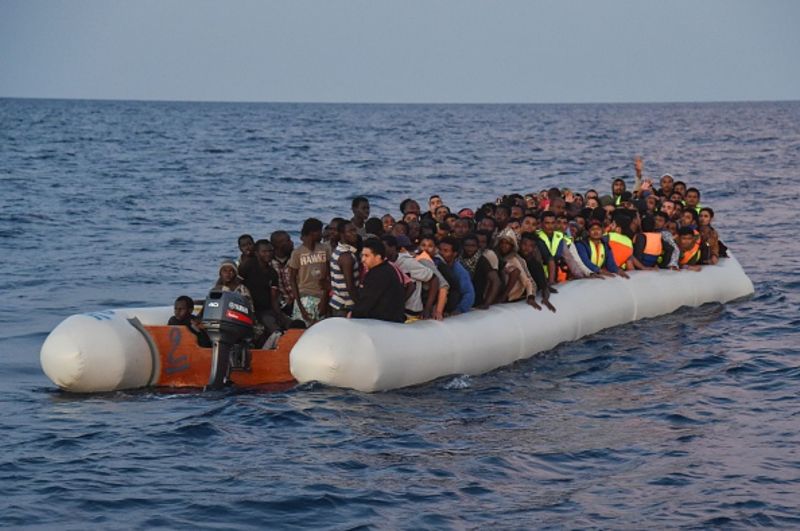If it looks as though Europe is clutching at straws to stop hundreds, sometimes thousands, of migrants from crossing the Mediterranean into Italy every day, that’s exactly what’s happening. On Monday, the European Union’s foreign ministers approved restrictions on the supply of inflatable boats and outboard motors to Libya.
The boats that bring the migrants, mostly Africans these days, have long been a target of European efforts to dismantle the human-trafficking networks that control the Libya-Italy route. According to a U.K. parliamentary report, Operation Sophia, the joint European naval operation that began in 2015, had destroyed 452 boats by mid-June. These were larger, mainly wooden boats that could carry up to 500 people and offered the smugglers the greatest profit margins. Removing them from the Mediterranean has made the migrant crossings riskier. As a European Commission communication pointed out in January, the smugglers’ “business model” has changed:
They increasingly place irregular migrants and refugees on cheap and completely unseaworthy inflatable dinghies that have no prospect of ever reaching the Italian shores, assuming they will be picked up near or within Libyan territorial waters. The fact that such dinghies now account for 70 percent of all boats leaving the Libyan coast contributes to making journeys increasingly dangerous and to the rise in the number of deaths at sea.
What the focus on destroying boats hasn’t changed are the migrant arrival numbers. On July 14, 5,122 people came, close to the record of 5,504 set on Aug. 31, 2016. But the EU stubbornly keeps after the boats, this time rubber ones.
A Sophia report from December 2015, published by WikiLeaks three months later, noted:
Reports of rubber boast (sic) being imported from China and transhipped in Malta and Turkey are supported by a recent interception by Maltese customs of 20 packaged rubber boats in a container destined for Misratah, Libya. As there are no legal grounds for holding such shipments, it was released for delivery to the destination.
That cargo would now be seized. But Europe has little control over the Chinese boat trade.
China has a lively inflatable boat industry with some 180 builders. Some two-thirds of rubber boats imported to Europe come from China. The manufacturers and sellers there know how their products are often used. On Alibaba, the biggest Chinese online market, the dinghies are marketed as “refugee boats.”
It’s easy to predict the consequences of the export restrictions. Dinghy shipments to Libya will no longer go through Malta, but rather through Turkey and North Africa. The EU sanctions have a loophole for fishermen, which will be exploited. If a shortage is created, smugglers will have to pay more for the vessels, so they’ll cram even more migrants into them or to reuse the boats instead of dumping them at sea. This may result in more deaths; so far this year, 2,174 people drowned or went missing trying to make the crossing, compared with 2,951 by this point of the year in 2016.
In May, the EU asked China to help stop the shipments. But the producing country can’t reasonably be expected to stop a large homegrown industry from shipping rubber boats to Turkey or Morocco.
The ugly reality of the current migrant crisis is that Europe can do little to stop the smuggling. The boat restrictions and EU participation in the training of the Libyan coast guard are the hopeless flailings of a bloc trapped by the consequences of the 2011 North Atlantic Treaty Organization military operation, which accelerated regime change in Libya but left it lawless and the coast practically unpoliced. In the same document that imposed the rubber boat restrictions, the EU reiterated “its firm support” for the internationally recognized government of Prime Minister Fayez Al-Sarraj, which controls little in Libya beyond the capital city of Tripoli.
This is a losing game. There’s no point in repeating the bromide that the Libyan conflict cannot be resolved by force. Force is exactly what’s likely to resolve it, when the strongest rebel group manages to consolidate the country or when it splits up the way Somalia did. Apart from pinpointing the strongest rebels and backing them militarily — an unpalatable option to democracy-supporting Europeans — the only solution to human trafficking out of Libya would be to land an expeditionary force to pursue the smugglers. Since the EU’s joint military capability is modest, this should be an operation for NATO, which helped create the original mess and should help clean it up.
If that ever happens, Chinese rubber boat sales will drop a little — but then the boat-building companies weren’t started with African migrants in mind. They’ll just have to go back to courting clients who want dinghies because they like to go fishing.
Bloomberg
